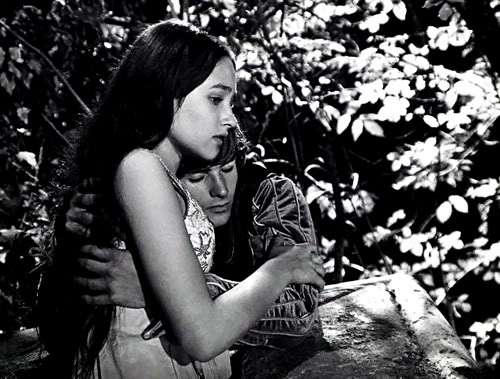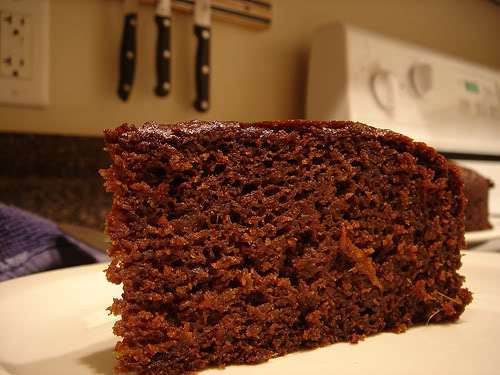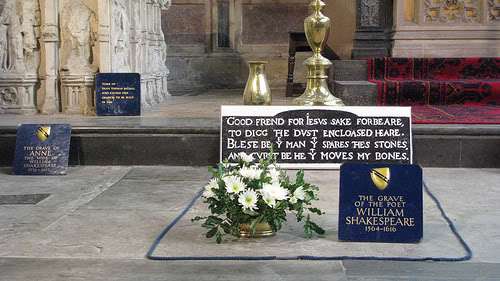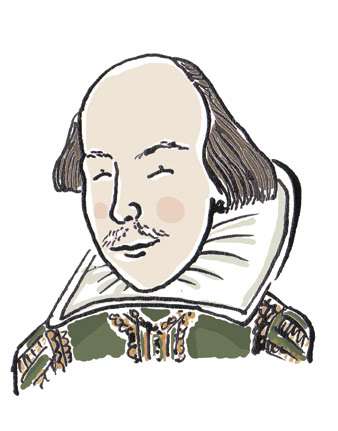“Dost thou think, because thou art virtuous, there shall be no more cakes and ale?” ~ Shakespeare, Twelfth Night.

Chandos portrait of Shakespeare, not yet authenticated.
Huzzah, I say, Huzzah!
And, bullyrook, scullion, rampallian, fustilarian! Let me tickle your catastrophe, o trencher-friends!
Lords, Ladies, Cousins and Curs: don your finest cauls, corsets, breeches and brocade! Only your finest jeweled or flowered ruffs will do. If thou hast need for a codpiece, joyfully tie a big one
on — for today is Will Shakespeare’s 445th birthday!

Ay, our most beloved red-haired poet, actor, and dramatist from Stratford-upon-Avon, who gave us 38 plays, 154 sonnets, and several other poems besides, is still the brightest star amongst all the luminaries who ever dared to tarry with the English language. His comedies, tragedies, and histories are still the most widely performed on the planet, and even after centuries of scholarship, speculation, and debate — some details of his life, as well as doubt over his authorship, continue to mystify and enthrall enthusiasts and detractors alike.

Franco Zefferelli’s “Romeo and Juliet” (1968).
photo from EmMe09’s photostream.
I must admit I didn’t truly “get” Shakespeare until I saw the Franco Zefferelli version of “Romeo and Juliet” in high school. I remember swooning over Leonard Whiting, and thinking Olivia Hussey the most beautiful woman ever. For the first time, I really listened to Shakespeare as these actors delivered their lines, and realized how beautiful, varied, complicated, precise, multi-faceted, and glorious the English language really was. For months afterwards, I listened to my R&J record and recited some of the most memorable speeches, imagining myself in “fair Verona, where we lay our scene.”
In college, I was fortunate enough to make the requisite “English major pilgrimmage” to Stratford-upon-Avon one summer, to see the Bard’s first digs for myself. I remember it to be dark, rustic, and well suited to short people. I knew that Shakespeare married an older woman, Anne Hathaway, when he was just 18, and she, 26. I loved visiting her cottage, and purchasing a mini copy of Shakespeare’s sonnets at the gift shop. Several years later, I would return to England, meet and marry Len, and celebrate with an Elizabethan banquet.

Shakespeare Birthplace, Stratford-upon-Avon.

Anne Hathaway’s Cottage (photo by SnowmanRadio).
These days, I am still trying to process the impact Shakespeare has had on modern English. They say the average person has a working vocabulary of around 10,000 words, a good novelist, probably around 15,000. Shakespeare’s personal arsenal contained approximately 30,000 words; he used between 17 – 23,000 different words in his plays, and is responsible for introducing and/or inventing at least 1700 words. Some of these are quite surprising, since we use them all the time without knowing their source: puke, lonely, critic, exposure, amazement, bump. Many common phrases, such as, “sweets to the sweet,” “lean and hungry look,” “break the ice,” ” heart on your sleeve,” “live long day,” and, “one fell swoop,” were also coined by the Bard.

photo by Karmel Design.
In evaluating his genius, we need to consider that Shakespeare was truly a product of his age. During the reign of Elizabeth I, English was just coming into its own as a respected, significant literary language, replacing Latin as the language of serious intellectual and artistic activity in England.
Rules of grammar and spelling had not yet been fully formalized, so Shakespeare had free reign to experiment, bend and shape words, and play with syntax and vocabulary to suit his style, thereby giving each of his characters a very distinct speech. This accounts for such high hootin’ insults as: “thou clay-brained guts, thou knotty-pated fool, thou whoreson obscene greasy tallow-catch” (Henry IV, Part l).
Later, when Dr. Johnson compiled the first dictionary, he used many of Shakespeare’s words and phrases to establish standard usage.

Sonnet 30
photo by Rienk Mebius.
The Renaissance was probably the most exciting and fertile period in history for a man of Shakespeare’s talents to be living and working. New words were being coined every day as a result of Latin and European influences. Though he did not attend university, Shakespeare knew how to make the best possible use of all the resources at hand.
It is well known that he “borrowed” virtually all of the plots for his plays save four. This was common practice during a time in which plays were written solely for the acting company and not meant for publication. But Shakespeare’s genius lies with his innovations in the dramatic potential of characterization, plot and language. The soliloquy, for example, became a way of delving deeper into the human psyche, rather than just conveying information. One could say Shakespeare took a conventional plot, and stretched it up, down, inside and out, embellishing it by entwining various sources, combining elements from world literature, picking and choosing just what he needed to create characters who would deepen our understanding of human nature.
Ultimately, it comes down to his singular use of language. There are many who say, “Shakespeare is unfathomable,” or that “he is too dense and daunting,” without realizing that they use some of his words and phrases all the time. Though his sonnets were written for an aristocratic audience and privately circulated before their unauthorized publication, his plays were written for a popular audience.
Unlike most theatre goers today, who may sit silently throughout a performance, Elizabethan audiences went to hear Shakespeare, and actively participated by yelling, hooting, snacking, and chatting as they followed the action. The Globe Theatre seated about 3,000 people, with “groundlings” standing right in front of the stage for a penny admission, while wealthier patrons paid more for tiered seating. Shakespeare purposely wrote for this open air, many sided, circular venue. His language was weighted with metaphor, conceit and double entendre, by turns lyrical, bawdy, colorful, grandiose. His stories appealed to the entire spectrum of London society, and he further engaged the audience via direct address and asides.

New Shakespeare Globe Theatre, Southwark (opened in 1997).
photo by wallyg.
I’ve been thinking about the rascals, knaves, servants and beggars who spent their pennies to hear Shakespeare. Most of them probably couldn’t read, never owned any books, and were completely removed from the prevailing sonneteering vogue practiced by the aristocracy. Yet, the Bard of Avon gave them poetry! And, as poetry was born of an oral tradition, the plays nourished and enriched and entertained with stories they loved and understood — exalted, earthy, profane and sublime. It is estimated that approximately 10% of London’s population attended the theatre then, much more than in major cities today.
Well, now, no theatre experience would be complete without provisions. Street vendors of the period sold mini meat pies, apples, oranges, nuts, ale, and gingerbread, all of which were consumed as well as liberally hurled at the actors according to whim. Hazelnuts were especially popular, and were the equivalent of modern day Raisinettes. I can’t imagine a more passionate crowd, littering the ground with parings and nutshells, truly believing that “the play is the thing.”
Prithee, make haste and raise a tidy tankard of cider, ale, wine, or mead, in honor of Mr. Shakespeare! Neither a borrower nor a lender be; get thee some gingerbread!

photo by allison on flickr.
William Shakespeare died of unknown causes on his 52nd birthday, April 23rd, 1616. He is buried at Holy Trinity Church, Stratford-upon-Avon. His epitaph curses any who may dare disturb his remains.

Shakespeare’s tomb (photo by LuvNYankee.)
Do you know where the following phrases came from? (Answers below.)
1. Bated breath
2. Dead as a doornail
3. Neither rhyme nor reason
4. Laughing-stock
5. The green-eyed monster
6. The apple of her eye
7. Remembrance of things past
8. In my heart of hearts
9. To thine own self be true
10. Salad days.
For a list of other common words and phrases credited to Shakespeare, click here and here.
To see Shakespeare’s Poesies, an A-Z listing of food references in Shakespeare’s plays, click here.
Today is Talk Like Shakespeare Day!! Go here to get in on all the fun.
To see a video clip from “Shakespeare in Love,” (one of my all-time fave movies), click here. *swoon*
The famous balcony scene from the Zefferelli movie can be seen here.

Here are the answers to the phrase quiz above:
1. Merchant of Venice
2. Henry VI, Part 2
3. Comedy of Errors
4. Merry Wives of Windsor
5. Othello
6. Love’s Labour’s Lost
7. Sonnet 30
8. Hamlet
9. Hamlet
10. Antony and Cleopatra.
*Shakespeare illos from emillustration’s flickr photostream.
P.S. Zounds! Shakespeare did NOT invent the word, “gadzooks!”
“An I had but one penny in the world, thou shouldst have it to buy gingerbread.” ~ Costard, Love’s Labour’s Lost.

Lovely!
What a wonderful post on the bard, Thank You Jama… you make me want to go see a play! I think everyone should see a Shakespeare play as their first contact with his gorgeous words, not hear it butchered by sleepy teenagers in first period!
LikeLike
I always forget that he was red-haired.
LikeLike
GREAT post, Jama! I never truly got Shakespeare until I saw Mel Gibson in Hamlet. Then I went through the entire Kenneth Branagh catalog, finally got that Much Ado About Nothing actually was a brilliant comedy. Now I can better appreciate it all when I read it (which isn’t nearly enough)
Happy birthday, Bard!
LikeLike
Tanita Says 🙂
Huzzah! And again I say, Huzzah!
I shall have to a.) quickly finish up my banana bran chocolate chip cookies so I have an excuse to make gingerbread, and b.) read The Tempest tonight.
LikeLike
Re: Lovely!
Yes, seeing a Shakespeare play performed well is definitely the way to go. He wrote for an audience of listeners, not necessarily readers. Wonder what he would think of all the literary criticism his works have spawned over the years?
LikeLike
Me too. He probably had freckles, too :D!
LikeLike
Movies have made a huge difference to Shakespeare’s fan base. Not everyone has the opportunity to see a good live performance, but mostly everyone can see a movie version here or there. And the plays simply have to be “heard” to be fully understood and appreciated. Isn’t Kenneth Branagh great?
LikeLike
Re: Tanita Says 🙂
Didya have to make me jealous with the banana bran chocolate chip cookies? I swear, you cook up the most interesting things. I love gingerbread and want to tackle Love’s Labours Lost again. It’s been quite awhile.
LikeLike
Hee! Good to know where my name (#6) comes from – aside from my dad, which is where I learned it originally. 😀
Of course, I was prepared to say that #2 came from Dickens.
I never “got” Shakespeare by reading it. I do remember seeing that movie version of R&J my freshman year in high school, but I think I was still too young to really appreciate it. It helped slightly when we read Taming of the Shrew out loud the following year, but even so, it didn’t really come alive for me.
However, once I saw Midsummer Night’s Dream produced live at college, and saw Kenneth Branaugh’s Much Ado About Nothing in the theater, I finally was able to appreciate the humor and actions in his stories. It was almost magical, to suddenly realize I could “get” him. Also, although I know it’s fictionalized, I love the way Romeo and Juliet comes alive as Shakespeare writes it in Shakespeare In Love – the words of the actual play are still the same, after all, and much more vibrant to me now.
LikeLike
Great post. I admit to being a huge Shakespeare fan–there was a wonderful theater near us when I was growing up, and I saw some of the best performances there that I ever have. Now we live 20 minutes away from a couple of good Shakespeare venues and are gradually intro’ing it to our son. MacBeth was a BIG hit!
This morning, of course, he was pretty fed up, as I kept sticking “…eth” onto all my verbs and calling him a young knave. In Chicago, and why not everywhere?–it’s Talk Like Shakespeare Day today!
LikeLike
“Shakespeare in Love” is sublime — a beautiful marriage between a fictionalized plot with lines from the play. It definitely deepened my appreciation of the original. Poor Anne Hathaway, though — stuck in Stratford while her husband was covorting in London for most of their marriage. Ah, these actors. Can’t trust them! 😉
LikeLike
LOL! Perhaps if you called him a “flaming youth” he would like it better. Somehow I associate knaves with tarts! 😀
Lucky you, to have good venues so close to home. We have to travel into DC, either for the Folger Shakespeare Theatre or the Shakespeare Theatre Co. I kind of like traditional treatments, rather than modern interpretations. I try to stay open minded though.
LikeLike
Oh, THIS is a post worthy of dear William.
All those words in 40 some years.
LikeLike
To celebrate the Bard’s Birthday
Had googled and got your blog—thought you might be interested in knowing that Penguin Classcis just published an enriched eBook Classic of Hamlet to celebrate Will’s big birthday. Has a lot of cool stuff—Shakespeare places to visit, famous phrases, contemporary reviews of his work by his peers, illustrations.
LikeLike
Thanks, Liz. You share a birth month with the great one :)!
LikeLike
I’m positive the Chandos painting is the Bard. Loved this post. Although nobody knows his birth date, just his baptismal date, which is the 26th. But he did die on April 23rd, and it could have been his birth date as well, so may as well celebrate it all at once!
LikeLike
Jama, I have to thank you because my bid for the gorgeous Anna Alter painting you posted for Grace’s fundraiser won. I wouldn’t have seen it without you, and of course I’m thrilled.
In other news, my daughter just got a summer internship she’s very excited about, at a fancy sunglass place, so selling cupcakes probably wouldn’t have fit in anyway. But a friend of hers got a job there. I told her she must send pictures! (of course samples would be better, but)
Have a good weekend!
LikeLike
Re: To celebrate the Bard’s Birthday
Thanks for the heads up!! I’ll have to look into it :).
LikeLike
Apparently a new portrait of him has surfaced that is causing a stir: http://www.shakespearefound.org.uk/, the Cobbe portrait.
I like that his beard is reddish, so it could be authentic.
Yes, his exact date of birth is unknown, as are some other details of his life. But you must admit, it’s pretty “dramatic” to die on the same calendar day that you were supposedly born. Maybe historians thought so too :). . .
LikeLike
No, really? Congratulations!! Wow, that is SO fabulous. Coincidentally, I’m excited because alphabet soup is going to be a stop on Anna’s blog tour for Abigail Spells next month :).
Your daughter will be so cool selling those sunglasses this summer, and yes, her friend must send cupcake pictures (drool)!
LikeLike
The Cobbe portrait is probably him, too – and is the basis for other portraits. The articles on it are interesting – people say it’s clear it was painted of a living, breathing person, unlike the Chandos portrait which was posthumous, but likely based on the Cobbe portrait.
LikeLike
Shakespeare
A belated comment… spring brings craziness into this household. Thanks for this post as this is my first year with Shakespeare. Our 8th graders attend a Shakespeare festival every year and have to give a performance. We are having a “Shakespeare party” this week. The kids are doing a shortened version of Macbeth. Lucky for me, I have trained Shakespearean actress as my director. I just have to support her and coordinate. Thanks again!
LikeLike
Re: Shakespeare
Oh, Ellen, that sounds like so much fun! Out damned spot! I hope there was some gingerbread at the party :).
LikeLike
The nostalgia — I was so enamored by Franco Zeferrelli’s Romeo & Juliet. I still have the soundtrack, will have to give it a spin on my new retro CD-&-etc. record player.~ Lois
LikeLike
Yes, the Zefferelli version is such a classic. Happy listening to you!
LikeLike